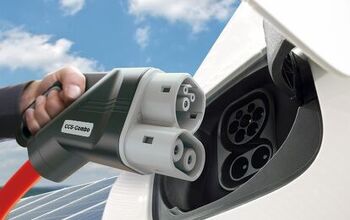Ford, BMW, VW, Daimler Prepare European Charging Network

Established German automakers, partnered with Ford Motor Co., are beginning construction on their pan-European fast-charging network this year. The plan is to expand charging points along highways — thus making cross-continent easier for EV owners and, more importantly, future electric-car buyers.
While none of that affects us in the West, the plot does provide some insight as to how quickly we might be able to expect something similar to take hold. Now called “Ionity,” VW announced it is roping in Porsche and Audi to help construct 400 high-power charging (HPC) stations by 2020. The first 20 charging stations are scheduled to open by the end of this year in Germany, Norway, and Austria.
The venture’s chief executive, Michael Hajesch, says Ionity wants grow that number to 50 by early 2018. “The first pan-European HPC network plays an essential role in establishing a market for electric vehicles. Ionity will deliver our common goal of providing customers with fast charging and digital payment capability, to facilitate long-distance travel,” Hajesch explained.
While starting the project in Germany and growing it out from there omits the whole of Europe from initial enjoyment, it does allow it to be genuinely functional for a smaller region. Theoretically, the United States could do the same thing and kind of is with VW’s Electrify America subsidiary — which is spending nearly half of its $2 billion budget in California. However, the majority of fast-charging stations built near North American highways thus far have been done by Tesla Motors or as part of state-funded projects.
Back in Europe, the Ionity charging stations are to be set roughly 120 km apart from each other. Most are planned to include facilities and shopping via Tank & Rast and Circle K. Capacity is said to be “up to 350 kW per charging point,” using the European charging standard Combined Charging System to significantly reduce charging times compared to existing systems.
“The launch of Ionity represents a breakthrough in the move towards a comprehensive rapid charging infrastructure in Europe”, said the chairman of Porsche’s executive board, Oliver Blume. “Creating a functioning charging infrastructure is necessary for ensuring electromobility is accepted and further expanded. With the rapid charging network from Ionity, we are ensuring that our customers can use electric cars on long journeys without compromising on convenience. These high-charging stations are capable of charging our Mission E to 80 per cent in just 15 minutes – equivalent to a range of 400 kilometres.”
[Image: Porsche]

A staunch consumer advocate tracking industry trends and regulation. Before joining TTAC, Matt spent a decade working for marketing and research firms based in NYC. Clients included several of the world’s largest automakers, global tire brands, and aftermarket part suppliers. Dissatisfied with the corporate world and resentful of having to wear suits everyday, he pivoted to writing about cars. Since then, that man has become an ardent supporter of the right-to-repair movement, been interviewed on the auto industry by national radio broadcasts, driven more rental cars than anyone ever should, participated in amateur rallying events, and received the requisite minimum training as sanctioned by the SCCA. Handy with a wrench, Matt grew up surrounded by Detroit auto workers and managed to get a pizza delivery job before he was legally eligible. He later found himself driving box trucks through Manhattan, guaranteeing future sympathy for actual truckers. He continues to conduct research pertaining to the automotive sector as an independent contractor and has since moved back to his native Michigan, closer to where the cars are born. A contrarian, Matt claims to prefer understeer — stating that front and all-wheel drive vehicles cater best to his driving style.
More by Matt Posky
Latest Car Reviews
Read moreLatest Product Reviews
Read moreRecent Comments
- Dartman Nice job Healy! A genuine “truth about cars” instead of troll bait.
- Charlie Oh by the way the steering is so rusted that it actually is loose, and the transmission makes strange whirring and scraping sounds. The car is falling apart from rust.
- Charlie 78 for my ‘09 Mercury mariner. It has 850k miles on it and leaks oil. It has 9 scratches, deformed bodywork, and severely rusted frame and suspension. When you stand on the duct taped rear bumper, the suspension creaks loudly. Also it has a loud vibration and rod knock, and the driver rear window is falling out. Ps. Don’t they normally have a roof rack and display screen? Cause mine doesn’t.
- Honda1 More disposable junk from Hyundai.
- Analoggrotto The ORDER BOOKS in Australia have netted 300% above projection. Australia is so awesome and they are embracing the Telluride DIesel to overtake the Prado. Pentagon data, and eATPs rule the discussion, bar none. Toyota fans can go home with their sorry little turbo 4 cylinder.


































Comments
Join the conversation
"While none of that affects us in the West..." Huh? "The West" includes all of the original members of NATO (most of which are European), together with a number of other European countries. So, this project affects most people in the geopolitical West.
The only effect it might have in America is which type of charging connection - CCS or CHAdeMO - will be utilized. I know BMW uses CCS as does GM but Nissan uses CHAdeMO. If one standard becomes more prevalent it could end this "VHS vs. Betamax" charging system we have today. Not to mention Tesla off in their own little corner